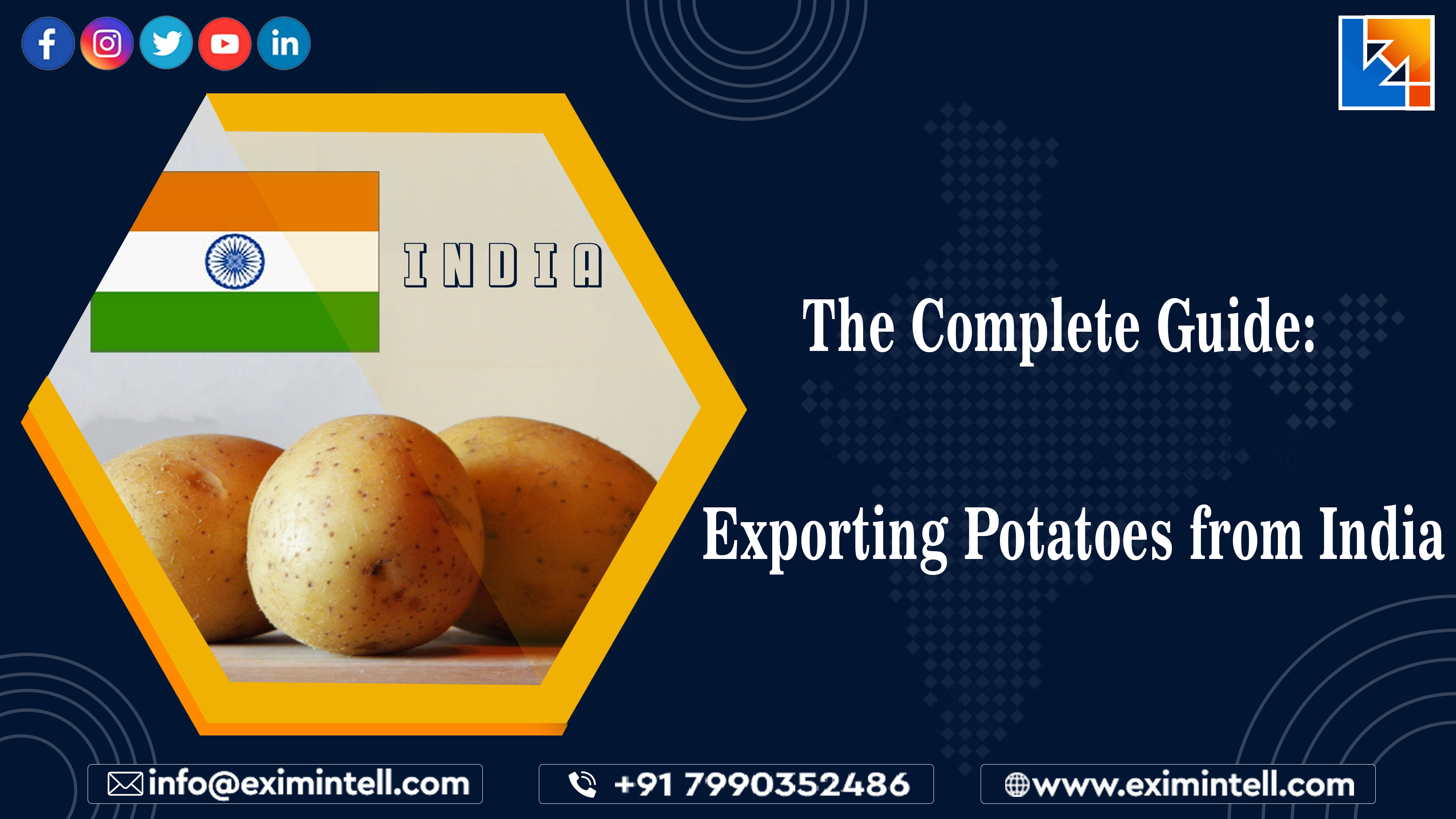Potatoes have been a popular staple food for centuries and are now grown worldwide, including in India. With increasing demand in the global market, Exporting Potatoes from India has become a profitable business venture for farmers and entrepreneurs alike. But where do you start? How do you ensure quality control? And what are the legal requirements involved? In this comprehensive guide, we delve into all aspects of Exporting Potatoes from India – from selecting the suitable variety to navigating trade agreements – to help you build a successful Potato Export Business. So grab your notepad and get ready to learn everything there is to know about Exporting Potatoes from India!
Overview of Exporting Potatoes from India
The potato is one of the most popular vegetables in the world and is an integral part of many cuisines. India is a major producer of potatoes, with over 50 million tonnes produced each year. Indian Potatoes are Exported to many countries worldwide, including the United Arab Emirates, Saudi Arabia, Pakistan, Nepal, Bangladesh, Sri Lanka, and Mauritius.
There are many considerations when Exporting Potatoes from India, including choosing the right type for your market, ensuring they are appropriately packaged and labeled, and complying with all Export Regulations. This guide will provide all the information you need to Export Potatoes successfully from India.
Steps to Follow When Exporting Potatoes from India
1. Determine if the potatoes you want to export are of the type that can be legally Exported from India. Some types of potatoes, such as seed potatoes, cannot be Exported from India.
2. Obtain a license from the Agricultural and Processed Food Products Export Development Authority (APEDA). This is necessary to Export Potatoes from India.
3. Choose a market for your potatoes. When Exporting Potatoes, you will need to find buyers interested in them. There are many potential markets for Indian Potatoes, so it is essential to research to find the best match for your products.
4. Prepare your Potatoes for Export. This includes cleaning and packing them following your chosen market(s) requirements.
5. Ship your potatoes to their destination(s). You will need to arrange transportation and ensure all required paperwork is in order before sending your shipment(s).
Legal Requirements for Potato Export Business
As an agricultural product, potatoes fall under the Agricultural and Processed Food Products Export Development Authority (APEDA) purview. APEDA is an organization that regulates and promotes the Export of Agricultural Products from India. All exporting companies must be registered with APEDA to obtain an Export Licence. The registration process is simple and can be completed online.
In addition to registering with APEDA, Potato Export Businesses must obtain a phytosanitary certificate from the National Plant Protection Organization (NPPO). The certificate is required for all shipments of potatoes destined for export. The NPPO certification confirms that the potatoes are free from pests and diseases and meet international quality standards.
Finally, all companies Exporting Potatoes from India must have a valid Certificate of Origin (COO). The COO is issued by the Export Inspection Agency (EIA) and certifies that the potatoes were grown in India and are of Indian origin. The COO is required for customs clearance at the destination country.
With these three documents – registration with APEDA, a phytosanitary certificate from NPPO, and a COO from EIA – your Potato Export Business can operate legally in India.
What Should You Know About the Potato Market?
The potato is the world’s third most important food crop and India’s second-largest producer of potatoes globally. The Indian potato market is complex and dynamic, with myriad stakeholders involved in the country’s production, marketing, and consumption.
Farmers: Potato farmers in India are primarily smallholder farmers, with over 80% of farms being less than 2 hectares in size. Most potato growers are in Uttar Pradesh, West Bengal, Bihar, and Punjab. Potato farming is labor-intensive, with manual tasks such as planting, harvesting, and grading accounting for a significant proportion of costs.
Potato Processors: Potatoes are processed into various products, including flakes, chips, granules, starch, and flour. The Indian potato processing industry is dominated by a few prominent players, with an estimated 70% of the market being controlled by just three companies. India’s top five potato processing companies are Hindustan Unilever Limited (HUL), ITC Limited, Britannia Industries Limited, McCain Foods Limited, and Nestle India Limited.
Retailers: Potatoes are sold through several channels in India, including grocery stores, street vendors, wholesale markets, and online retailers. Modern trade channels such as supermarkets and hypermarkets account for a small but growing share of potato sales in India. Some of the leading retail chains selling Potatoes in India include Big Bazaar (Future Group), Reliance Fresh (Reliance Retail), and More Super.
Different Types of Potatoes Grown in India
Many different types of Potatoes are Grown in India, each with its unique flavor and purpose. The most common type of Potato Grown in India is the Kashmiri potato, a small, red-skinned variety often used in curries and other dishes. Other popular varieties include the Aloo Gobi, a white-skinned potato often used in stir-fries, and the Rajasthani potato, a large, starchy variety perfect for making boiled or mashed potatoes.

No matter what type of potato you are looking for, you can find it in India. With so many different kinds of potatoes to choose from, you will be able to create any dish you can imagine. So why not Export Potatoes from India today?
Pricing Strategies and Cost Estimates for Potato Exports
Correctly pricing your Potato Exports is essential for your prosperity. Overpricing them may lead to difficulty in finding purchasers, while undercharging could result in not generating an income.
To determine the right price for your potatoes, you must consider several factors, including production costs, shipping costs, and market conditions. You’ll also need to decide whether to sell FOB (free on board) or C&F (price and freight).
Once you understand all the costs involved in Exporting Potatoes from India, you can start to develop a pricing strategy that will help you meet your goals.
One common export pricing strategy is offering a discount for large orders. This can help you attract buyers and boost sales. Another option is to work with a freight forwarder who can help you get better rates on shipping.
Whatever pricing strategy you choose, regularly monitor market conditions and adjust your prices accordingly. Doing so will maximize your chances of success when Exporting Potatoes from India.
Tips for Establishing and Maintaining a Successful Exporting Business
When it comes to Exporting Potatoes from India, there are a few things you need to keep in mind to be successful. Here are some tips:
1. Make sure you have a Good Quality Product
This is the most important thing. If your potatoes are not of good quality, you will not be able to sell them at a reasonable price, and no one will want to repurchase them. Ensure you source your potatoes from a reliable supplier and meet all the Requirements for Export.
2. Know your Market
Do your research on the country or region you want to export to. Find out what their tastes are and what kind of potatoes they prefer. It is also essential to know the import regulations of the country you are exporting to ensure your potatoes meet all the required standards.
3. Have a Good Marketing Strategy
Your marketing strategy should include both online and offline channels. You must create a strong brand identity for your company and promote your potatoes through various marketing channels such as social media, online advertising, trade shows, etc. Only by having a comprehensive marketing strategy will you be able to reach your target audience and successfully sell your potatoes.
Conclusion
Exporting Potatoes from India is a great way to reach customers in foreign countries and earn income. The right know-how and planning can be very lucrative for businesses. This guide provided detailed steps on how to start Exporting Potatoes from India and be successful at it. You also have learned what types of documents you need and essential considerations throughout the process. Now that you understand all there is to know about Potato Export from India, why not give it a try?


















